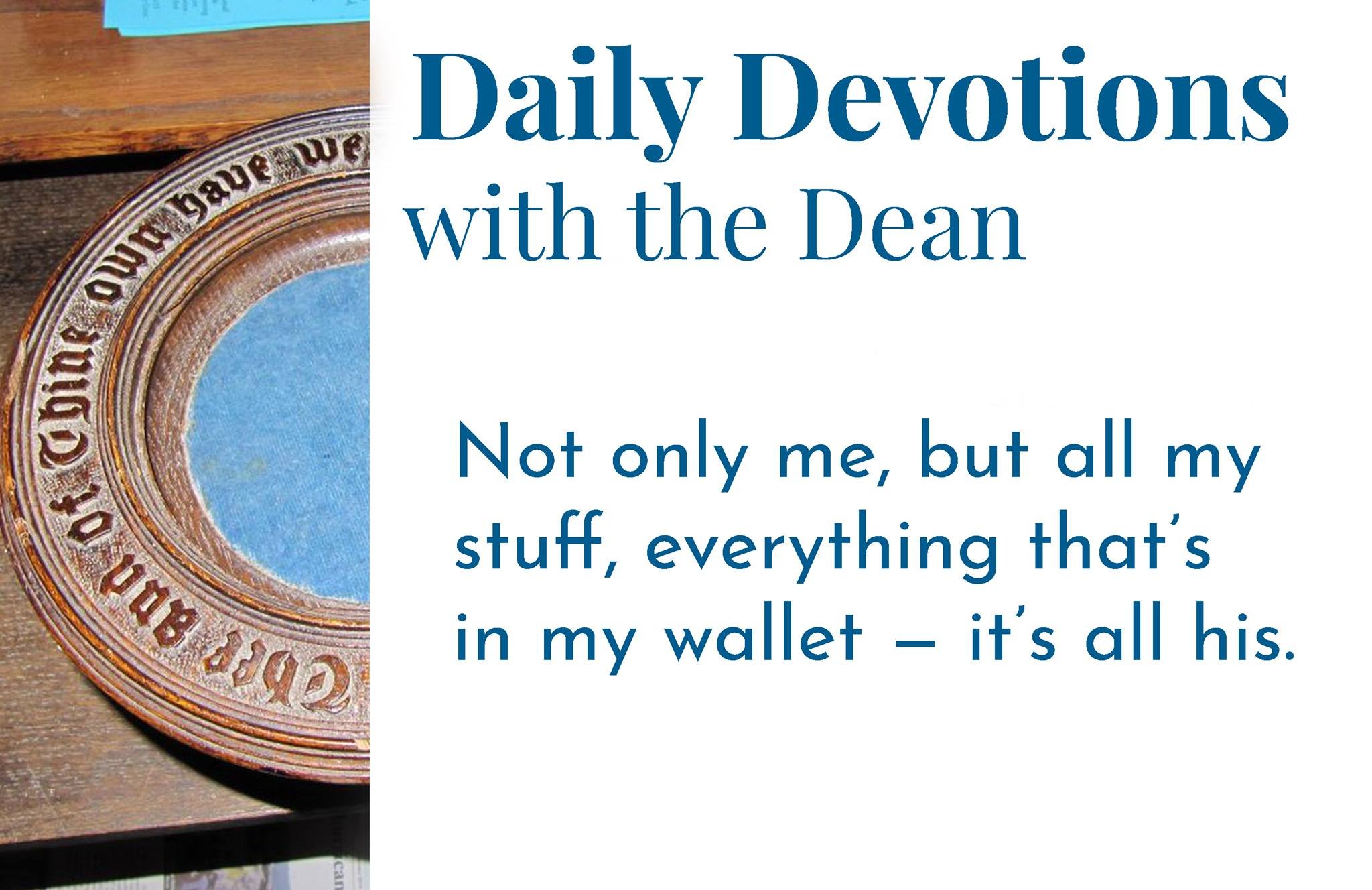Tuesday • 2/14/2023 • epiphany 6 year 1
Welcome to Daily Office Devotions. I’m Reggie Kidd. Thanks for joining me.
Although this is the sixth week of Epiphany, we’re taking a detour from the Daily Office readings this week. Instead, we’ll be thinking through various facets of worship and how our Lord provides meaningful communion with him through our formal corporate worship as well as in individual worship in our daily devotions. The thoughts offered here are excerpts (sometimes lightly edited) from articles I wrote for Worship Leader magazine a few years ago.
They come from a season in my life when I was on a journey from more generic free-form worship to worship shaped by the classic liturgy. I hope these observations help you in your own quest to love God and your neighbor. We’ll resume our reflections on the Daily Office next week.
“One Offering”
The offertory has always seemed an odd thing to me. When I was a kid, the offering followed the sermon, and for all intents and purposes concluded the service. I thought this was where you paid the pastor for the sermon. I remember thinking, “That’s a lot of pressure for a preacher.”
In recent months, the pressure preachers seem to feel is to how to convince people to give generously during hard times.
The question of generosity became an especially pressing one for me in 2008, when the world’s economy tanked. Like other families, mine, too, was affected.
Nevertheless, it proved to be a ruinous blessing. It was a time to rediscover the generosity of God, and to give thanks. Our refrigerator was, after all, still full. And it was a time to remember that ours is the God of the “refrigerator-less.”
The liturgical church I’ve become a part of takes up an offering as part of its weekly communion, following the Book of Common Prayer:
Representatives of the congregation bring the people’s offerings of bread and wine, and money or other gifts, to the deacon or celebrant.
The pattern is ancient, and embodies profound truth. The offering begins the ministry of the Table, which follows the Ministry of the Word. Ushers pass plates, and then, on behalf of the whole congregation, bring forward a dual offering: the elements for the Table and the monetary donations for the church. (In other times and places, the donations might include livestock or produce or handiwork.)
A prayer of “Great Thanksgiving” follows, celebrating God’s attributes along with his creative and redemptive acts. Then the prayer asks the Lord to bless the gifts — explicitly the bread and wine, implicitly the monetary donations.
For whatever reasons, in many churches (like the church of my upbringing) the offertory is no longer linked to communion, and I wonder if that’s created a disconnect between our offerings and the whole story of redemption.
The Table reminds me of God’s extravagant generosity. He was generous not just in word, but in deed. Jesus came, and he made the one Offering that counts. “Christ loved us and gave himself for us, a fragrant offering and sacrifice to God” (Eph. 5:2). The only true worship is Jesus, Offering and Offerer. Staggering gift and overwhelming love, on lavish display especially at the Table.
When the “stuff” of his redemption (the communion elements) is wedded to the “stuff” of my life (my gifts), my story gets folded into the Bible’s story line. As the bread and wine embody Jesus’s totally giving himself for me, so my gifts bespeak my surrender to his total claim on me. “You are not your own,” Paul reminds me, “you were bought with a price” (1 Cor. 9:19b-20a). Not only me, but all my stuff, everything that’s in my wallet — it’s all his.
More, our offerings imitate Jesus’s Offering, and are made holy by that One Offering. The bread and wine establish no merit — the merit is all of his death and life. The money is not a payment for the sermon. It’s a means of saying, “Thank you for rescue. Thank you for freedom from the Egypt of sin. Now, who around me lives in a kind of Egypt, and how may I — on your behalf — participate in their rescue?”
Moses had required: “… you shall love the alien, for you were aliens in the land of Egypt” (Deut. 10:19) — in effect, have an eye to the “refrigerator-less” among you. Now Jesus commands: “A new commandment I give you: that you love one another as I have loved you” (John 13:34). The generosity of the Exodus with its “mighty hand and an outstretched arm” yields to the generosity of the Incarnation with its arms stretched out on a cruel cross. I give, in part, to participate in God’s care for those still in need of redemption.
Some truths are better perceived than conceived, to paraphrase Marshall McLuhan. One such truth is the dynamic of divine generosity, displayed most extravagantly at his Table. God’s generosity comes to us in his Son, then calls forth from us an answering generosity, expressed first in the offering of ourselves back to him in thanks, and second in the offering of ourselves and our gifts to one another and to a needy world.
Be blessed this day,
Reggie Kidd+



